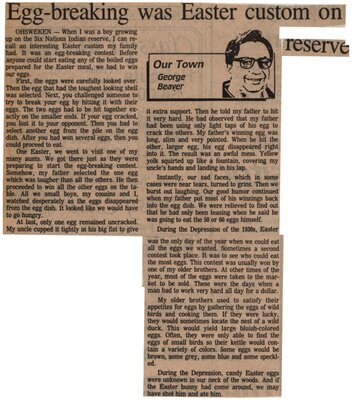OHSWEKEN - When I was a boy growing up on the Six Nations Indian reserve, I can recall an interesting Easter custom my family had. It was an egg-breaking contest. Before anyone could start eating any of the boiled eggs prepared for the Easter meal, we had to win our eggs.
First, the eggs were carefully looked over. Then the egg that had the toughest looking shell was selected. Next, you challenged someone to try to break your egg by hitting it with their eggs. The two eggs had to be hit together exactly on the smaller ends. If your egg cracked, you lost it to your opponent. Then you had to select another egg from the pile on the egg dish. After you had won several eggs, then you could proceed to eat.
One Easter, we went to visit one of my many aunts. We got there just as they were preparing to start the egg-breaking contest. Somehow, my father selected the one egg which was tougher than all the others. He then proceeded to win all the other eggs on the table. All we small boys, my cousins and I, watched desperately as the eggs disappeared from the egg dish. It looked like we would have to go hungry.
At last, only one egg remained uncracked. My uncle cupped it tightly in his big fist to give it extra support. Then he told my father to hit it very hard. He had observed that my father had been using only light taps of his egg to crack the others. My father's winning egg was long, slim and very pointed. When he hit the other, larger egg, his egg disappeared right into it. The result was an awful mess. Yellow yolk squirted up like a fountain, covering my uncle's hands and landing in his lap.
Instantly, our sad faces, which in some cases were near tears, turned to grins. Then we burst out laughing. Our good humor continued when my father put most of his winnings back into the egg dish. We were relieved to find out that he had only been teasing when he said he was going to eat the 50 or 60 eggs himself.
During the Depression of the 1930s, Easter was the only day of the year when we could eat all the eggs we wanted. Sometimes a second contest took place. It was to see who could eat the most eggs. This contest was usually won by one of my older brothers. At other times of the year, most of the eggs were taken to the market to be sold. These were the days when a man had to work very hard all day for a dollar.
My older brothers used to satisfy their appetites for eggs by gathering the eggs of wild birds and cooking them. If they were lucky, they would sometimes locate the nest of a wild duck. This would yield large bluish-colored eggs. Often, they were only able to find the eggs of small birds so their kettle would contain a variety of colors. Some eggs would be brown, some grey, some blue and some speckled.
During the Depression, candy Easter eggs were unknown in our neck of the woods. And if the Easter bunny had come around, we may have shot him and ate him.




